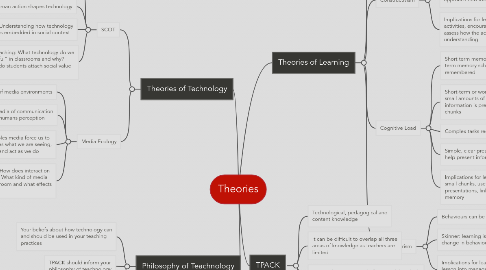
1. Theories of Technology
1.1. SCOT
1.1.1. Social construction of technology
1.1.2. Human action shapes technology
1.1.3. Understanding how technology is embedded in social context
1.1.4. Implications for teaching: What technology do we consider "successful" in classrooms and why? What technology do students attach social value to?
1.2. Media Ecology
1.2.1. Study of media environments
1.2.2. How media of communication affects humans perception
1.2.3. It tries to find out what roles media force us to play, how media structures what we are seeing, why media make us feel and act as we do
1.2.4. Implications for education: How does interaction with media affect students? What kind of media should we have in the classroom and what effects will it have?
2. Philosophy of Teachnology
2.1. Your beliefs about how technology can and should be used in your teaching practices
2.2. TPACK should inform your philosophy of teachnology
2.3. Implications for education: How can technology help up be the teachers we want to be? What technology is important to us?
3. Theories of Learning
3.1. Connectivism
3.1.1. Learning is focused on creating networks
3.1.2. The capacity to know is most important
3.1.3. Information flows in a network - learners must be able to distinguish what information is important
3.1.4. Implications for learning: teachers must use technology, focus on building student skills within networks, teach students to find and filter information
3.2. Constructivism
3.2.1. People learn and create meaning from experiences and reflecting upon experiences
3.2.2. Using past experience to approach new ideas
3.2.3. Implications for learning: More "hands on" activities, encourage students to constantly assess how the activity is helping them gain understanding
3.3. Cognitive Load
3.3.1. Short term memory must be connected to long term memory schema in order to be remembered
3.3.2. Short-term or working memory can only hold small amounts of data - it is more efficient if information is presented in small meaningful chunks
3.3.3. Complex tasks require repetition
3.3.4. Simple, clear presentations can help present information
3.3.5. Implications for learning: present information in small chunks, use repetition and clear presentations, link material to students long-term memory
3.4. Behaviourism
3.4.1. Behaviours can be reinforced
3.4.2. Skinner: learning is a function of change in behaviour
3.4.3. Implications for learning: breaking down the lesson into manageable tasks for teaching, modelling,
